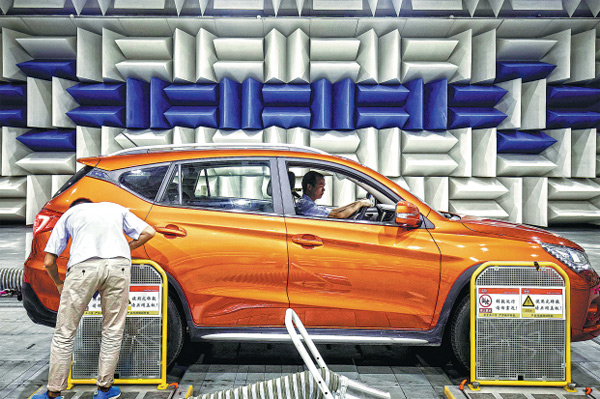Automakers in rush for batteries as electric cars continue to rise

 |
| A vehicle sits in an acoustics testing laboratory at BYD's headquarters in Shenzhen, Guangdong province. The nation's leading maker of electric cars is to consider supplying its batteries to competitors. [Photo/Bloomberg] |
Carmakers in China are scrambling for batteries as it is increasingly evident that electric cars are to continue their rise as the star of the future automotive industry.
That development has led carmakers to take out their checkbooks and lay out hard cash to buy stakes in the car battery sector.
Dongfeng Motor Corp has recently become a shareholder of CATL and is talking with another battery-maker, said Liu Weidong, the carmaker's deputy general manager.
CATL, based in Fujian province, is one of the biggest battery makers in the world, but became widely known when it became a BMW supplier.
"All carmakers are under great pressure in terms of new energy cars. We at Dongfeng are tech-oriented, and place great emphasis on core technologies and resources," Liu said.
He added Dongfeng will also invest at least 10 billion yuan ($1.54 billion) by the end of the year in terms of batteries, electric motors and electric control systems.
Dongfeng was not the first to join hands with battery-makers. Earlier this year, SAIC Motor, China's largest automaker, announced it was forging partnerships with CATL.
Industry insiders and analysts said such moves were understandable, especially when China has demanded that every carmaker in the country produce a number of new energy cars, starting from 2019.
"As the policy is promulgated, sales of electric cars will surge in the coming years and so will the demand for batteries," said Wang Chuanfu, chairman of BYD, China's biggest maker of new energy vehicles, in an interview with the National Business Daily.
China has been the world's largest market for new energy vehicles since 2015 and is planning to put 5 million such cars on its roads by the end of 2020.
The China Association of Automobile Manufacturers estimates that sales this year could reach 700,000, 40 percent growth year-on-year.
Wang said BYD is increasing its battery production to better prepare for the market.
In terms of car batteries, BYD held 17 percent of the market in China, second only to CATL, which took a 25.8 percent market share in the first half of the year.
As part of its plan to further improve its market position, BYD is now in the process of building a joint venture with Guoxuan High-tech Power Energy Co, a battery-maker in Anhui province.
International carmakers are building their battery plants in China. BMW is soon to unveil a battery plant at a Chinese joint venture in Shenyang, Liaoning province.
The plant is expected to produce 33,000 high-voltage battery packs a year for its localized new energy cars.
Daimler AG has announced plans to produce batteries as part of its electric car program in China.
Daimler and Chinese partner BAIC Motor will invest 655 million euros in the production of battery-powered electric cars, and this includes an investment of "three-digit million euros" for battery production by the joint venture. Some carmakers are going even further to secure supplies of resources such as lithium and cobalt for batteries.
Late last month Great Wall Motor, China's biggest SUV-maker, said it will spend 146 million yuan on a 3.5 percent stake in Pilbara Minerals, which owns the Pilgangoora lithium-tantalum project in Western Australia.
In China, prices of such raw materials are rising rapidly because of the bright prospects for new energy cars.
Of 159 lithium-related companies listed on the Chinese mainland, 133 saw their revenue grow in the first half of the year, according to the Securities Daily.
With the those bright prospects comes fierce competition. "China now has some 200 battery-makers, but only 40 or 50 will survive three to five years later and the top five will hold at least 70 percent of the market", Fang Jianhua, former head of Guoxuan High-tech Power Energy told the Securities Daily.




































